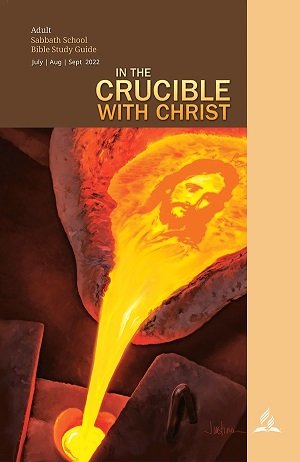by Jay Wintermeyer | 24 June 2022 | I’ve worked in Adventist radio, mission work, and church administration at the conference and union level for more than 29 years. I’ve enjoyed my work for the Adventist Church and have felt blessed to produce high quality content and programs that encouraged members and pointed people to […] Source: https://atoday.org/breaking-my-silence/
Sabbath: The Shepherd’s Crucible
Sabbath Afternoon
Read for This Week’s Study: Psalm 23:1-6, Romans 12:18-21.
Memory Text: “He restores my soul; He leads me in the paths of righteousness for His name’s sake” (Psalm 23:3-4).
Sophie leaned back against her bedroom door and slid to the floor. Tears were welling up fast, and it was only a moment before she was sobbing. “How could he? How could he!” Sophie had just received news that was breaking her heart. Someone she thought was a friend, someone she respected and trusted, was spreading awful gossip about her in order to ruin her reputation and the work she had been doing. Grabbing her Bible off the bed, she suddenly found herself staring at some very familiar words: “He restores my soul; He leads me in the paths of righteousness for His name’s sake. Yea, though I walk through the valley of the shadow of death, I will fear no evil; for You are with me; Your rod and Your staff, they comfort me” (, Psalm 23:4, NKJV).
“Surely this can’t be!” she blurted out to herself. But the logic seemed inescapable. The Shepherd in the psalm was guiding His sheep in paths of righteousness, but these very paths also seemed to wind their way into the valley of the shadow of death. Could it be possible that even this painful betrayal by a friend, this dark valley, could be used by God to train her in righteousness?
The Week at a Glance: At what times have you grown more spiritually — through the easy times or the harder ones?
Study this week’s lesson to prepare for Sabbath, July 2.
 (0)
(0)The post Sabbath: The Shepherd’s Crucible appeared first on Sabbath School Net.
Introduction: In the Crucible with Christ
The Crucified Creator
“All things were made by him; and without him was not any thing made that was made” (John 1:3).
“All things” were made by Him, Jesus, and yet — according to Scripture — “Jesus wept” (John 11:35). The Creator wept? Even more so, Jesus was “despised and rejected of men; a man of sorrows, and acquainted with grief” (Isaiah 53:3). The Creator, a man of sorrows, despised and rejected? And He once cried out, “My God, my God, why hast thou forsaken me?” (Matthew 27:46).
How could these things be? It’s because Jesus, our Creator, was also our Redeemer, and as such He was the Crucified God — the Creator who took on humanity and in that humanity suffered through a life of privation and toil that ended with Him hung on a Roman cross.
Thus, our Creator, the one in whom “we live, and move, and have our being” (Acts 17:28), suffered in humanity in ways that none of us ever could. We can experience only our own griefs, our own sorrows; at the cross He bore “our griefs, and carried our sorrows” (Isaiah 53:4) — all of them. It’s the most amazing act in all cosmic history.
With that background (that of the crucified God looming over us), we will for the next few months seek to better comprehend the incomprehensible — our own suffering, the sufferings of Christians, of those who have committed their lives to Christ. We make no claims to have all the answers or even many; we’re claiming only that “God is love” (1 John 4:8) and that although these things happen, we can trust God despite them and, indeed, grow in grace through them, no matter how painful the process.
This quarter we will study the Word of God and see how other flesh and blood, though radiated in faith, nevertheless faced despair, betrayal, disappointment, loss, injustice, and abuse (sound like anything you can relate to?). How did they cope? What did they learn? What can their examples teach us?
As we look at these people, their experiences, their struggles, and their trials of faith (which might be much like our own), we must always see them contrasted against the background of the Cross. We must always remember that no matter what anyone faces, Jesus Christ, our Creator and Redeemer, went through worse.
Our God is a suffering God. Even Albert Camus, hardly a Christian, understood some of the implications of the Cross and the sufferings of God there: “The night on Golgotha is so important in the history of man only because, in its shadow, the divinity abandoned its traditional privileges and drank to the last drop, despair included, the agony of death.” — Albert Camus, The Rebel (New York: Vintage International, 1991), p. 33. Or, as Ellen G. White expressed it: “The cross is a revelation to our dull senses of the pain that, from its very inception, sin has brought to the heart of God.” — Education, p. 263.
Our lessons are not a theodicy, the justification of God in the face of evil. Instead, as we’ve said, they’re an attempt to help us work through the inevitable suffering we all face here in a world in which sin is as easy as breathing. What we will try to show is that pain, suffering, and loss don’t mean that God has abandoned us; they mean only that, even as believers, we share now in the common lot of a fallen race. The difference is that, through Jesus and the hope He offers, we can find meaning and purpose can be found in what seems meaningless and purposeless and that somehow, even if we can’t imagine how, we can trust the promise that “all things work together for good to those who love God” (Romans 8:28, NKJV) — the God who, though He made all things, suffered all things, too (and that’s why we love Him).
Gavin Anthony, this quarter’s principal contributor, grew up in Sri Lanka as a missionary kid. He worked as a pastor in England and was conference president in Iceland when he authored these lessons.
 (1)
(1)The post Introduction: In the Crucible with Christ appeared first on Sabbath School Net.
Source: https://ssnet.org/blog/introduction-in-the-crucible-with-christ/
Ladies Who Do More Than Lunch: Female Pastors Feted by NAD
North American Division (NAD) Ministerial Association has a goal to double the number of female pastors in the division. Number of pastors who are women in the NAD has increased from 101 to nearly 200. The Adventist denomination is still struggling with the issue of women’s ordination. 24 June 2022 | “You need to ask no […] Source: https://atoday.org/ladies-who-do-more-than-lunch-female-pastors-feted-by-nad/
Inside Story: Praying for Ten Years
Praying for 10 Years
Winston Crawford, a U.S. volunteer teaching English in Moscow, invited one of his Russian students to the Seventh-day Adventist church on Sabbath.

Image © Pacific Press
The student, Sasha, did not seem moved by the worship experience. He had been raised in an atheistic family, and he looked downright bored.
Winston felt sad. “I’m not going to try to invite him back,” he told himself. “I can see clearly that he didn’t enjoy himself.” Instead, he started praying. He prayed that the Lord would touch Sasha’s heart.
As the months rolled by, Winston and Sasha struck up a friendship. During vacation, Sasha invited him to travel to the Karelia region near Finland to meet his parents and younger brother. Winston kept praying.
After completing his year of volunteer service, Winston returned to the United States but remained in contact with Sasha. When Sasha visited the United States after several years, the two spent time together in Chicago.
Winston kept praying. More than 10 years passed.
One day, Sasha sent a message via WhatsApp. “I want to read the Bible,” he wrote. “Could you help me to understand it?” Winston was delighted. “Sure!” he texted back. They agreed to meet once a week.
At their first meeting, Sasha was fascinated as they read Genesis 1. He was particularly impressed that God gave a vegetarian diet in Genesis 1:29, which says, “And God said, ’See, I have given you every herb that yields seed which is on the face of all the earth, and every tree whose fruit yields seed; to you it shall be for food” (NKJV). Sasha was a vegetarian, and he had thought that following a plant-based diet was simply good practice.
“I had no idea that this is from the Bible!” he said.
At the end of the meeting, he expressed awe. “I have read Pushkin and Dostoevsky, but it seems like something different is happening when I read the Bible,” he said. “It’s like the words are coming up off the page to me.”
Winston was elated. He felt certain that the Holy Spirit was elevating His Word to reach Sasha’s heart. After three weeks of Bible study, Sasha asked whether they could increase their meetings to twice a week. Winston kept praying. “It’s inspiring for me that after more than 10 years he wants to read the Bible — and not only that but I get to study the Bible with him,” Winston said in an interview. “I know this is God. I know it completely is God.”
Produced by the General Conference Office of Adventist Mission. Find more mission stories at adventistmission[dot]org
 (3)
(3)The post Inside Story: Praying for Ten Years appeared first on Sabbath School Net.
Source: https://ssnet.org/blog/inside-story-praying-for-ten-years/


